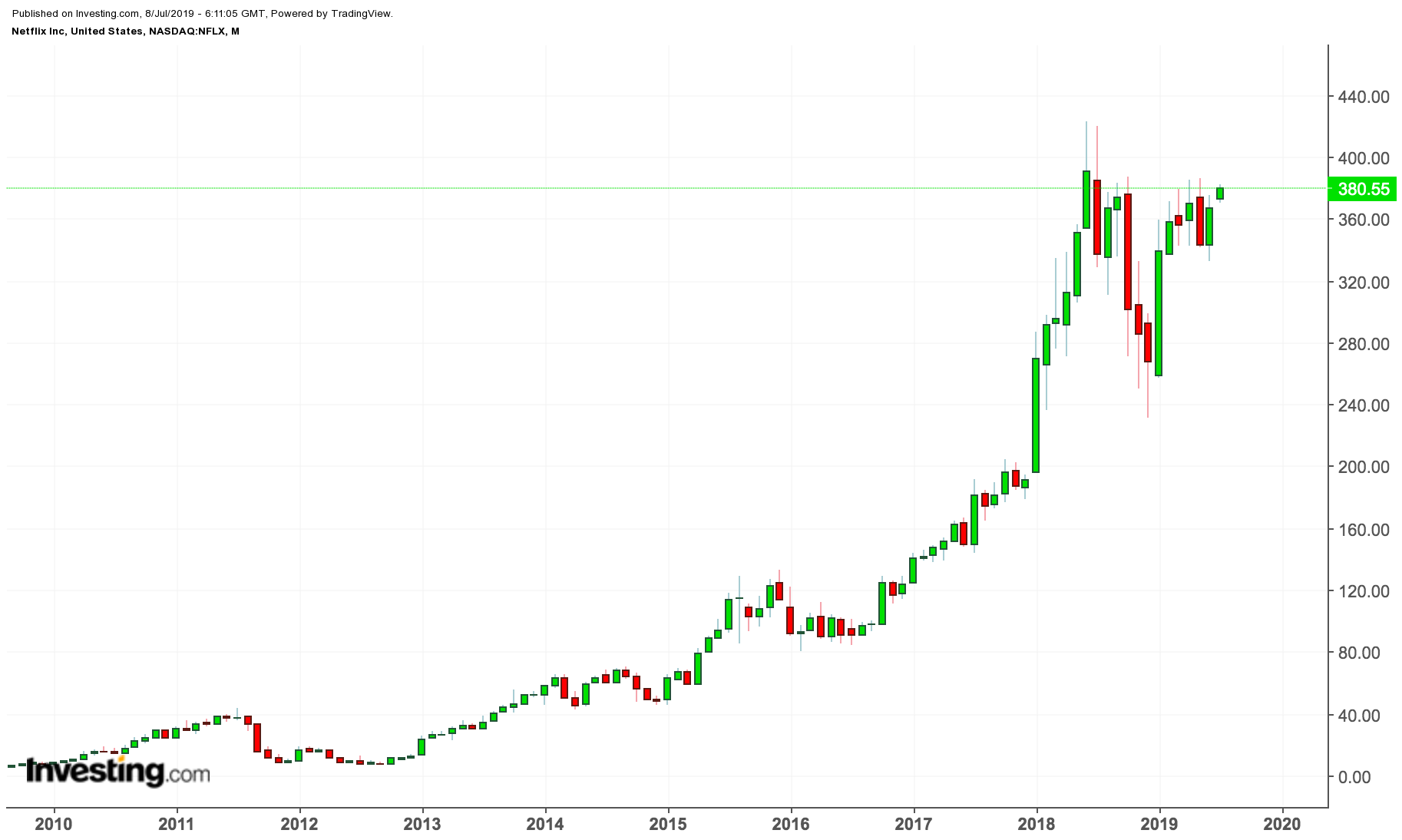The video-streaming giant Netflix Inc. (NASDAQ:NFLX) has had quite an uncharacteristically dull year. Its stock has done nothing for investors in the last 12 months, raising concerns that the producer of some of the most popular shows may have seen the best in the current growth cycle.
Trading at $380.55 at Friday's close, Netflix stock is down more than 9% in the past 12 months after hitting a record high of $423.19 in June 2018. In the preceding decade, the company that evolved from a video-rental business delivered unimaginable returns to investors. Its stock skyrocketed about 6,000% over 10 years.

It's not unusual for high-flying tech companies to lose their momentum and stop showing the level of growth markets have already priced in, often resulting in short bearish spells. For Netflix, however, the current weakness is more pronounced due to the fast changing competitive landscape. Here are the three biggest threats that, in our view, are keeping Netflix shares under pressure:
1. Competition Is Coming
The competition for Netflix is certainly heating up and the company has begun to feel the pinch. The biggest challenge, in our view, will come from the global entertainment giant Walt Disney Company (NYSE:DIS) which is building a war chest, arming itself to take on rivals in the video-streaming market after a persistent declining trend in the cable business.
Disney announced in April it will rival Netflix with its Disney+ app, to be launched in the U.S. on Nov. 12, for $6.99 a month—half the price of Netflix. It will offer programming from Disney’s biggest franchises, such as Star Wars and Marvel Studios, in addition to new, original programming. The service is likely to have between 60 million and 90 million subscribers by the end of fiscal 2024.
Disney said this year it will surrender about $150 million in operating income after cutting off licensing to competing services, such as Netflix. “Captain Marvel,” the superhero blockbuster, is the first Disney movie in years that won’t eventually show on Netflix.
Last week, NBCUniversal announced that it plans to take the popular sitcom “The Office” off Netflix and will start airing on its own online platform beginning in 2021. The Office is the No. 1 streamed show on Netflix and has accounted for more than 52 billion minutes of viewing last year, according to NBCUniversal, a unit of Comcast Corp (NASDAQ:CMCSA).
In the fast crowding streaming business, Apple Inc. (NASDAQ:AAPL) and Amazon (NASDAQ:AMZN) also have grand plans to take the bigger share of the streaming pie. In March, Apple unveiled an original content service called Apple TV+, a revamped TV app, and an Apple TV channels service for tapping into outside providers including HBO, Showtime, and Starz.
2. Intensifying Cash-Burn
All that new competition means Netflix will have to spend more to create original programming and market that content more aggressively to keep signing up new subscribers who will soon be bombarded with new offers and attractions.
Last year, Netflix spent more than $12 billion to purchase, license and produce content. This year, that figure is expected to go up to $15 billion as the company allocates $2.9 billion more to marketing. These costs come as Netflix is expected to report $20.2 billion in revenue in 2019, according to analysts surveyed by Refinitiv.
Since mid-2014, Netflix has been cash flow negative, a lingering concern for the stock bears who believe Netflix isn’t even close to being cash-flow positive — and that reality will soon haunt its bulls.
“There are competitors with deep pockets who are going to hire the same producers and create compelling content. Because of that, they do not have a moat like an Amazon. They do not have a moat like a Google (NASDAQ:GOOGL),” short-seller Andrew Left, who has successfully bet against stocks like Valeant Pharmaceuticals (NYSE:BHC), said on a CNBC program.
3. Plateauing Growth In Home Markets
The other big challenge for the streaming service is how to fuel growth when investors are getting impatient to see profitability.
After raising prices in some of its largest territories this year, Netflix is predicting that it will add just 5 million new customers in the second-quarter ended June 30, well short of Wall Street forecasts for 6.09 million. The company blamed the slowdown in part on its pricier offerings.
Though the price increases should help improve Netflix’s bottom line, they come at a time when streaming competitors are gearing up to make the market more competitive. And what if subscriber growth in its most lucrative market, North America, continues to slow and the company keeps burning more cash each year to cover the cost of its success? Investors would find it hard to ignore a mix of that sort, and the company's stock price would, sooner or later, reflect that reality.
Bottom Line
Netflix stock’s journey upward has largely been unhindered in the past decade. But with the increasing competition, rising costs, and saturation in the domestic market, it will be increasingly difficult for the streaming giant to repeat that performance. The company’s quarterly earnings, scheduled to be released on July 17, will provide more insight on these potential risks.
